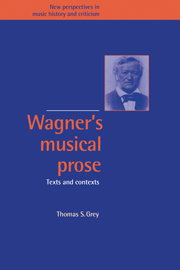Book contents
- Frontmatter
- Contents
- Preface
- 1 Wagner and the problematics of “absolute music” in the nineteenth century
- 2 Beethoven reception and the hermeneutic impulse: “poetic ideas” and new forms
- 3 Engendering music drama: Opera and Drama and its metaphors
- 4 The “poetic-musical period” and the “evolution” of Wagnerian form
- 5 Endless melodies
- 6 Motives and motivations: leitmotif and “symphonic” drama
- Appendix 1 The “poetic-musical period” (from Opera and Drama, Part III, section 3)
- Appendix 2 Principal writings of Richard Wagner cited in the text
- Bibliography
- Index
3 - Engendering music drama: Opera and Drama and its metaphors
Published online by Cambridge University Press: 22 September 2009
- Frontmatter
- Contents
- Preface
- 1 Wagner and the problematics of “absolute music” in the nineteenth century
- 2 Beethoven reception and the hermeneutic impulse: “poetic ideas” and new forms
- 3 Engendering music drama: Opera and Drama and its metaphors
- 4 The “poetic-musical period” and the “evolution” of Wagnerian form
- 5 Endless melodies
- 6 Motives and motivations: leitmotif and “symphonic” drama
- Appendix 1 The “poetic-musical period” (from Opera and Drama, Part III, section 3)
- Appendix 2 Principal writings of Richard Wagner cited in the text
- Bibliography
- Index
Summary
Die Musik ist ein Weib.
(Music is a woman.)
– Opera and Drama, Part I (III, 316)Metaphors of gender, and others
A passion for extravagant clothing, in life, finds a parallel in Wagner's passion for extravagant metaphor in his prose. Before he had the proper means to indulge the former fetish, he could at least afford the latter. And he certainly did so during the impecunious days of his early Swiss exile, when he produced his most notoriously prolix essays on musical and broadly cultural issues, in which no intellectual expense was spared in decking himself out in a luxuriant profusion of figurative language. Throughout the Zurich essays Wagner treats his abundant stock of metaphors rather in the fashion of musical leitmotifs: they continually reappear, transform, combine, and re-combine to suit the needs of the argument (which was, with Wagner, truly an improvisatory act). And like the fundamental motives of the Ring – what Wagner later designated as its malleable or plastic “nature motives” (plastische Natur-Motive, VI, 266) – the basic metaphors of the Zurich writings also derive largely from the natural world: harmony as “ocean,” melody as its rippling surface (boldly charted by Beethoven-as-Columbus), folk song as “wildflower,” drama as organism or human body.
- Type
- Chapter
- Information
- Wagner's Musical ProseTexts and Contexts, pp. 130 - 180Publisher: Cambridge University PressPrint publication year: 1995



